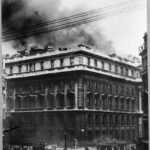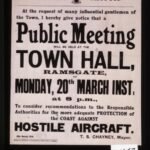One painful lesson I learned while seeing my Blitz reprisals article through to press was to stick. To. The. Bloody. Word. Limit! The article as accepted was well over and as a result I caused myself and the editors much grief while we worked to cut it down to an acceptable size. Never again.
Because they stood somewhat apart from the main argument of the article, the first cut I made was to delete two paragraphs addressing Tom Harrisson’s theory, in his (generally invaluable) 1978 book Living Through the Blitz, about the demands by the British press for reprisals, which is effectively a conspiracy theory insinuating press manipulation as cover for Bomber Command’s area bombing policy. Harrisson was co-founder and wartime head of Mass-Observation, and I think one of the main vectors of the idea that the British people didn’t want reprisal bombing of German civilians, especially if they’d been bombed themselves (which as I argue in the article itself is, at best, misleading). In the first deleted paragraph I showed why his conspiracy theory doesn’t make sense, and in the second I more tentatively (and much less convincingly, I think) gestured towards an explanation of why he came up with it. In relation to the published article, these paragraphs came just before the conclusion on page 406, and after the discussion of examples from the Mass-Observation archives of exactly the sorts of spontaneous demands of reprisals in blitzed areas that Harrisson explicitly denied ever happened. So these two paragraphs were also intended to help explain why he misrepresented the evidence in this way.
Since they stand on their own fairly well (the reference to Marchant is to the article she published from Coventry), I thought it worth posting the deleted paragraphs here, as a sort of teaser for the real article. I haven’t changed the text, except to expand the bibliographic references.
In Living Through The Blitz, thirty-five years after the event, Harrisson offered a theory as to why, in his view, the British press had been trying to create demand for reprisals:
There is little doubt that Churchill, his closest advisor Cherwell and ‘Bomber’ Harris relished the opportunity to destroy German cities and civilians. Their actions were sanctioned by Churchill’s closest publicity man, Lord Beaverbrook, who vigorously and elaborated on public demand, nay clamour, for ‘reprisals’ through his news chain. The ‘People of Coventry’ and all the rest were thus said to cry out ‘bomb back… kill… Destroy’ in vengeance. Under such alleged insistence the leaders could only, in decency, bow to the popular will.1
That is, the reprisals debate was merely propaganda designed to manufacture consent for the desired policy of area bombing. Harrisson’s theory is easy to disprove, however. As noted above, the policy of area bombing was only adopted by the RAF early in 1942, well after the Blitz, and Air Marshal Arthur Harris took charge of Bomber Command shortly thereafter. As we have also seen, during the Blitz itself, far from bowing to any popular will for vengeance, real or imagined, government representatives consistently described RAF bombing as precision attacks on military objectives alone, even on the rare occasions when reprisal bombing was undertaken. Finally, Harrisson greatly exaggerated the influence of the press baron Lord Beaverbrook. Beaverbrook did control, among other newspapers, the high-circulation Daily Express while simultaneously serving in Churchill’s cabinet as Minister of Aircraft Production. But, distracted by his official duties, he intervened in its editorial process much less than he had down before the war; in any event he was sceptical of the value of strategic bombing.2 Moreover, Marchant’s report for the Express from blitzed Coventry calling for reprisals was not in fact representative of that newspaper’s line on the bomber war, which was generally in support of much heavier bombing but only of military objectives. This was also true of the press at large. Among the important daily newspapers, only the Daily Mirror and, from late September 1940, the Daily Mail were consistent advocates of reprisals, and neither of these was owned by Beaverbrook.3 There is therefore no evidence for a conspiracy to delude the public into supporting area bombing.
At several places in Living Through The Blitz, Harrisson poured scorn on ‘the vast aerial activity of the Americans in Indo-China’ in the late 1960s and early 1970s, which he claimed was based on the same failed assumptions of fragile civilian morale used by the Luftwaffe and the RAF in the 1940s.4 This ‘Simplicism’, as Harrisson described it,
still prevails. It dominated US policy in the whole Indo-China war. In a sense, therefore, all these decades of bombing were aimed at nothing.5
While he was not politically active, Harrisson — who spent most of his life after the war in south-east Asia, mostly in Borneo — seems here to have allowed his distaste for US bombing policy against Vietnam in the Cold War to confirm his misunderstanding of British bombing policy against Germany in the Second World War.6
As I said, I’m not sure about that second paragraph. One reason is because it’s speculative psychologising and I’m uncomfortable with that sort of argument. The other is that shortly after the Blitz ended, Harrisson was already downplaying public support for reprisals (and, for the record, at that time he stated that he had no personal opinion on reprisals either way).7 His distaste and disdain for US bombing policy three decades later can’t explain that. In the end, Harrisson might have been right about the question of public support for reprisals — he was there and it was his job to know — but he was wrong about what the available data actually said about it, and I can’t explain that.
![]() This work is licensed under a Creative Commons Attribution-NonCommercial-NoDerivatives 4.0 International License.
Permissions beyond the scope of this license may be available at http://airminded.org/copyright/.
This work is licensed under a Creative Commons Attribution-NonCommercial-NoDerivatives 4.0 International License.
Permissions beyond the scope of this license may be available at http://airminded.org/copyright/.
- Tom Harrisson, Living Through the Blitz (Harmondsworth: Penguin, 1978), 314. [↩]
- Cf. Stephen Koss, The Rise and Fall of the Political Press in Britain (London: Hamish Hamilton, 1984), vol. 2, 573, 617; Mark Connelly, ‘The British people, the press, and the strategic air campaign against Germany’, Contemporary British History 16 (2002), 41. [↩]
- The Mail belonged to the Rothermere group while the Mirror was independent. [↩]
- Harrisson, Living Through the Blitz, 301. On US strategic bombing during the Vietnam War, see Marilyn B. Young, ‘Bombing civilians from the twentieth to the twenty-first centuries’, in Tanaka and Young, eds, Bombing Civilians: A Twentieth-Century History (New York and London: New Press, 2009), 162-7. [↩]
- Harrisson, Living Through the Blitz, 288. [↩]
- He did briefly consider standing as a Liberal candidate in the 1945 general election: Judith M. Heimann, The Most Offending Soul Alive: Tom Harrisson and His Remarkable Life (Honolulu: University of Hawai’i Press, n.d. [1999]), 197. [↩]
- Tom Harrisson, ‘A public demand for reprisals?’, Cambridge Review, 30 May 1941, 454-6. [↩]




Beaverbrook was Churchill’s loyal press agent? Well, it’s certainly an interesting interpretation.
Yes, there’s a lot that’s interesting about Harrisson’s theory.